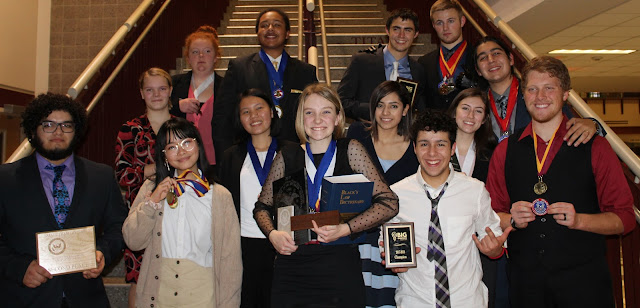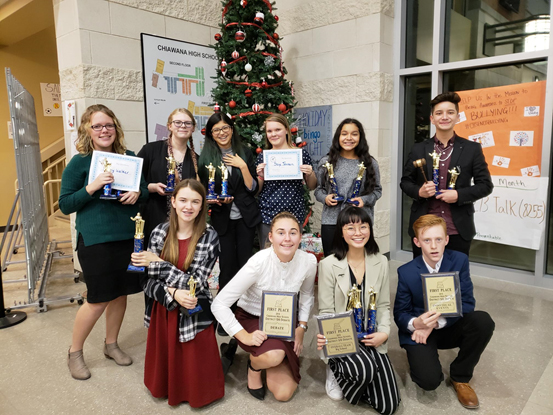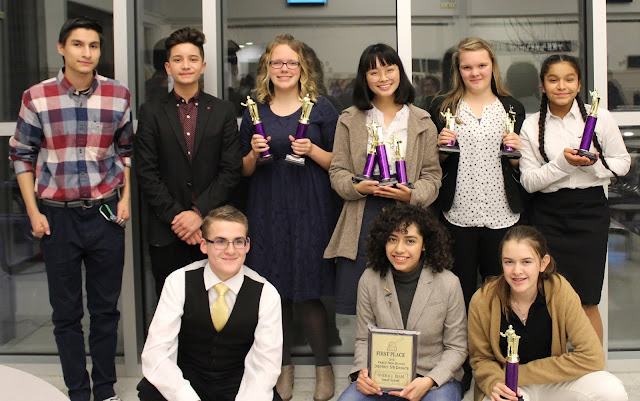Hon. Thomas S Foley Tournament
Better
settle in and grab a cup of coffee. This one is going to be long, and I’m not
even going to apologize.
Nine
years ago right about now, my team in Montana won state by a margin of 1.5
points. I believe it is still the smallest margin in the long, rich and
dramatic Montana Forensics history. It made for a great story about how every
bit of effort counts.
Today,
I can tell a better story. It’s the story of a tenth of a point.
Last
Thursday we pulled away from Chiawana at 11:30 a.m. with 14 students (conflict
with Solo and Ensemble cut our numbers), and a bus full of excitement, dread,
and hope.
Every
speech tournament means long days, but The Hon. Thomas Foley Memorial Tournament,
hosted by University High School in Spokane takes it to a whole different
level. I liken it to the Ironman Triathlon. Thursday is the bicycling portion,
with two rounds of debate and Sparfest, a round-robin of Spontaneous Argument,
a just-for-fun debate with topics like “Star
Trek is better than Star Wars,” or
“Your coach is better than my coach.” We stagger to the hotel at about 10 p.m.
Friday
is the swimming portion. The day begins at 7 a.m. with Student Congress and
International Diplomacy, an event unique to this tournament in which students debate
in French, Spanish, or German and represent various political parties of those
countries. Both Congress and ID conclude with a final session. Then, in the
afternoon, it’s two more rounds of debate and the first round of speech, and
hope you’re in bed by midnight.
Finally,
Saturday is the marathon. We begin at 7:30, and there is one more preliminary round
of debate, two more of speech, the elimination rounds of debate, and a final
round of speech. Awards start at about 11 p.m. and last for about 90 minutes,
because there are so very many awards to give.
This
tournament also offers events that are only found there—more on those later.
For
those who really want to test themselves, there is the Foley Award. To achieve
this award, a student must enter in Congress and debate and four
speech events. The winner is determined by how many speaker points they receive
in their preliminary rounds. To win this, students can’t be specialists; they
must be good at everything. Speaker
Tom Foley’s widow, Heather, is usually on hand to award the prize, although
this year she was in the Caribbean.
If
you’ve been following our team for very long, you know that we have some very
talented students, and three of them entered into competition for the Foley
award.
We
had our ups and downs, times we felt we were cheated by the judges, and times
we felt lucky just to be alive. Our crew of four alumni judges made it possible
for Sara and me to coach a little more than we sometimes can, because having
them there meant that we didn’t have to judge debate and congress and could
take care of our kids. There’s not a lot we can do for the kids when they’re
actually in a round, but in between there is often a lot of the psychological
part of coaching—helping kids to shake off a bad round, make adjustments for
the next round, or not to become over-confident if a round goes well. When we
are competing outside our own district, I don’t get to help in the tab room, so
I am as blind as the kids are as to just how things are going.
We
were not without potential disasters. A computer glitch meant that Isaiah Moore
wasn’t properly entered in Interpretive Reading, and we had to do a little groveling
and arguing to get him in (please look at his rank below to see how happy we
are that it worked). Baylee Easterday realized after her first round of
Political Impromptu that, while it had sounded perfect for her, it wasn’t, and
she never wanted to do it again. But she was going for the Foley Award, so she
had to do it again. But compared to last year, when we battled a blizzard, and
I lost most of my judges to stomach flu right before the tournament, it was a
piece of cake.
One
of the highlights of the tournament—one we’ll talk about for a long, long time—was
the traditional beginning of the awards ceremony: Spar finals, featuring our
own Isaiah Moore. I’m not sure I’ve laughed that hard in a long time, and I
invite you to watch it on our YouTube channel here (it is in two parts): https://www.youtube.com/channel/UC2icizFReZv4iQggWLPyj3g?view_as=subscriber
Now
that I’ve built suspense, it’s time to tell you how we did:
·
Team:
Second Place Small (under 15 competitors) Teams (Note: We were fourth overall
of 24 teams)
·
Open
Spar:
o
First
Place: Isaiah Moore
o
Third
Place: Ford Powers
·
Debate
Speaking Awards (given regardless of win/loss record, based on speaking ability
in the debate):
o
Big
Questions Top Speaker: Jacob Talsmat
o
Big
Questions 3rd Speaker: Trevor Schmitt
o
Big
Questions 8th Speaker: Saige Johnson
·
Big
Questions Debate: 1st Place, Trevor Schmitt
·
Open
Public Forum Debate: Quarter Finalists, Baylee Easterday and Linh Truong
·
International
Diplomacy: UN Security Council/Spanish, Nathaly Mendoza
·
Champs
Congress: Baylee Easterday, 3rd Place
·
Junior
Varsity Congress: Linh Truong, 4th Place
·
Open
Dramatic Interpretation: Monica Winn, 3rd Place
·
Open
Dual Interpretation: Caleb Hernandez and Ford Powers, 4th Place
·
Open
Editorial Commentary: Caleb Hernandez, 6th Place
·
Novice
Expository Speaking: Phuong Nguyen, 1st Place (Phuong is an exchange
student from Vietnam.)
·
Open
Expository Speaking: Malene Garcia, 3rd Place
·
Open
Extemporaneous Speaking: Baylee Easterday, 1st Place
·
Open
Tall Tales: Trevor Schmitt, 4th Place
·
Legal
Argument: Baylee Easterday, 1st Place (The special prize for this
event was a Black’s Law Dictionary, with an engraved plate on the cover noting
the occasion. Baylee plans on law school, so she really wanted to win this. The judges were all local attorneys and
judges, and one wrote on her ballot—underlined several times— “Go to law
school!”)
·
Dual
Improvisation: Ford Powers and Caleb Hernandez, 2nd Place
·
Open
Humorous Interpretation: Ford Powers, 4th Place
·
Novice
Impromptu Speaking: Linh Truong, 1st Place
·
Open
Impromptu Speaking:
o
Baylee
Easterday, 1st Place
o
Trevor
Schmitt, 4th Place
·
Novice
Interpretive Reading: Linh Truong, 4th Place
·
Open
Interpretive Reading: Isaiah Moore, 1st Place
·
Political
Impromptu: Baylee Easterday, 3rd Place
In
addition to the Foley Award, the tournament features another special award in
memory of a University High School alumna who never woke up one morning for a
tournament. This award is for students who exemplify the spirit of debate,
whether or not they are the best. I am proud to say that Malene Garcia was a
finalist for this award.
Which
brings us back to how I opened this very long story: a tenth of a point.
That’s
the margin with which Baylee Easterday won the Foley Award. She received a
granite plaque, and her name will be engraved on a permanent plaque at the
Federal Building in Spokane.
You
might have thought from reading this that I’m not too bad with words, but I
cannot adequately express my pride in this group of students. Every one of them
is remarkable. We laughed and cried our way through this awards ceremony.
On
February 16-17 we will have Regionals in Yakima. It is not ridiculous to state
that we have the potential for a regional champion in all but one event (we don’t
have any competitors in Lincoln Douglas debate).
Following
that, we are hosting the Inland Empire National Qualifying Tournament at
Chiawana on February 22-24. I am, quite frankly, frightened by the number of
students who could qualify for Nationals. The fundraising is mind boggling.
Thank
you for all your support. Please congratulate these students—they richly
deserve it. Feel free to follow us on Twitter (@hawktawkchs) or Facebook
(Chiawana Speech and Debate).




Comments
Post a Comment